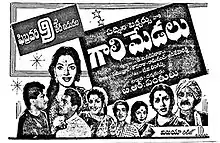| Gaali Medalu | |
|---|---|
 Theatrical release poster | |
| Directed by | B. R. Panthulu |
| Written by | D. V. Narasa Raju (dialogues) |
| Screenplay by | Dadamiraasi |
| Story by | M. S. Solamalai Padmini Pictures Unit |
| Produced by | B. R. Panthulu |
| Starring | N. T. Rama Rao Devika |
| Cinematography | W. R. Subba Rao |
| Edited by | R. Devarajan |
| Music by | T. G. Lingappa |
Production company | Padmini Pictures |
Release date |
|
Running time | 153 mins |
| Country | India |
| Language | Telugu |
Gaali Medalu (transl. Air Castles) is a 1962 Indian Telugu-language drama film, produced and directed by B. R. Panthulu. It stars N. T. Rama Rao, Devika with music composed by T. G. Lingappa.[1] The film was simultaneously made in Kannada as Gaali Gopura by the same banner and director. Both versions were successful at the box office.[2]
Plot
The film begins in a village, wealthy Ranganatham, who confides his property and infant Krishna to his guileful mate Panakalu and his benevolent wife Shantamma, whom she endears as her own. Since he is walking for his treatment of ailing TB, Panakalu ruses and flees by misreporting, shifting to Rangoon but putting Ranganatham’s money on assets in the town. Meanwhile, Ranganatham recoups and leaves for Rangoon in quest of his son. Now, the Panakalu couple is blessed with a son, Mohan. He switches Krishna to domestic labor and civilizes Mohan. Years roll by, and Krishna is amiable in the nurture of Shantamma, who darlings Lakshmi, the daughter of Panakalu’s relative Naganna. Panakalu fixes her knit with Mohan, who swindles Naganna as dowry. Wily Mohan proceeds to graduation, where he snares Nirmala, Zamindar’s daughter of their native, as a tycoon with the aid of his acolyte Platform. Meanwhile, Panakalu discerns the love affair of Krishna & Lakshmi, whom he chides and necks by declaring him an orphan despite the pleading of Shantamma. Here, Panakalu is cognizant of Mohan’s trap on the Zamindar, who ploys to get ahead of Lakshmi behind Krishna and lands at the city. A tea vendor, Kanakam, gives shelter to Lakshmi. Besides, Ranganatham is a millionaire present and is still on the hunt for his child. Destiny mingles Krishna with him as a servant who shares idolization beyond. Today, Mohan artfully spouses Nirmala by bankrupting Panakalu. Soon after, the fact breaks when the furious Zamindar allows Mohan to reside for his daughter's sack. Ergo, Mohan evades his parents. In that fray, Panakalu loses a limb, and they turn into a vagrant. Eventually, Platform gets acquainted with Kanakam, and they fall in love. Coincidentally, Ranganatham & the Zamindar are familiar, and he narrates his story. Overhearing it, Mohan intrigues exiting Panakalu at the outskirts and forges as Ranganathan's son. Meantime, Krishna spots Shantamma as a laborer, and both go for Panakalu but are consternated for him. However, he is shielded by Lakshmi & Platform. On cloud nine, Ranganatham arrives with Mohan, and he is startled to view Krishna, who warns him to quit until morning. The same night, Mohan attempts to slay Ranganatham, and Krishna secures him. Panakalu, Lakshmi, & Platform get here and divulge the actuality. At last, all unite, Panakalu repents, and Mohan also transforms. Finally, the movie ends on a happy note with the marriage of Krishna & Lakshmi.
Cast
- N. T. Rama Rao as Krishna
- Devika as Lakshmi
- S. V. Ranga Rao as Paanakaalu
- Jaggayya as Mohan
- Rajanala as Zamindar
- V. Nagayya as Ranganatham
- Ramana Reddy as Platform
- Jayanthi as Nirmala / Nimmy
- M. V. Rajamma as Santhamma
- Surabhi Balasaraswathi as Kanakam
- B. Rama Devi Venku (Rajanala's Wife)
- B. Viswanatham as Naganna
Soundtrack
Music composed by T. G. Lingappa.[3]
| Song title | Lyrics | Singers | Length |
|---|---|---|---|
| "O Raayudo" | Adisesha Reddy | Madhavapeddi Satyam, S. Janaki | 3:02 |
| "Krishna Manchi" | Ramchand | Renuka | 2:35 |
| "Ee Mooga Choopaela" | Samudrala Sr. | Ghantasala, Renuka | 3:21 |
| "Navaraagalu" | Ramchand | P. B. Srinivas, P. Susheela | 3:52 |
| "Tea Shopuloni Pilla" | Kosaraju | Pithapuram, K. Rani | 2:46 |
| "Gaali Maeda Koolipoyera" | Adisesha Reddy | Raghavulu | 3:52 |
| "Mamathalu Leni" | Samudrala Sr. | Ghantasala | 3:06 |
References
- ↑ "గాలిమేడలు". Andhra Patrika (in Telugu). 23 February 1962. Retrieved 28 November 2022.
- ↑ Sri (7 September 2005). "gAlimEDalu ( 1962 )". Telugucinema.com. Archived from the original on 23 December 2005. Retrieved 23 January 2021.
- ↑ "Gali Medalu (1962)-Song_Booklet". Indiancine.ma. Archived from the original on 28 November 2022. Retrieved 23 January 2021.
External links
- Gaali Medalu at IMDb